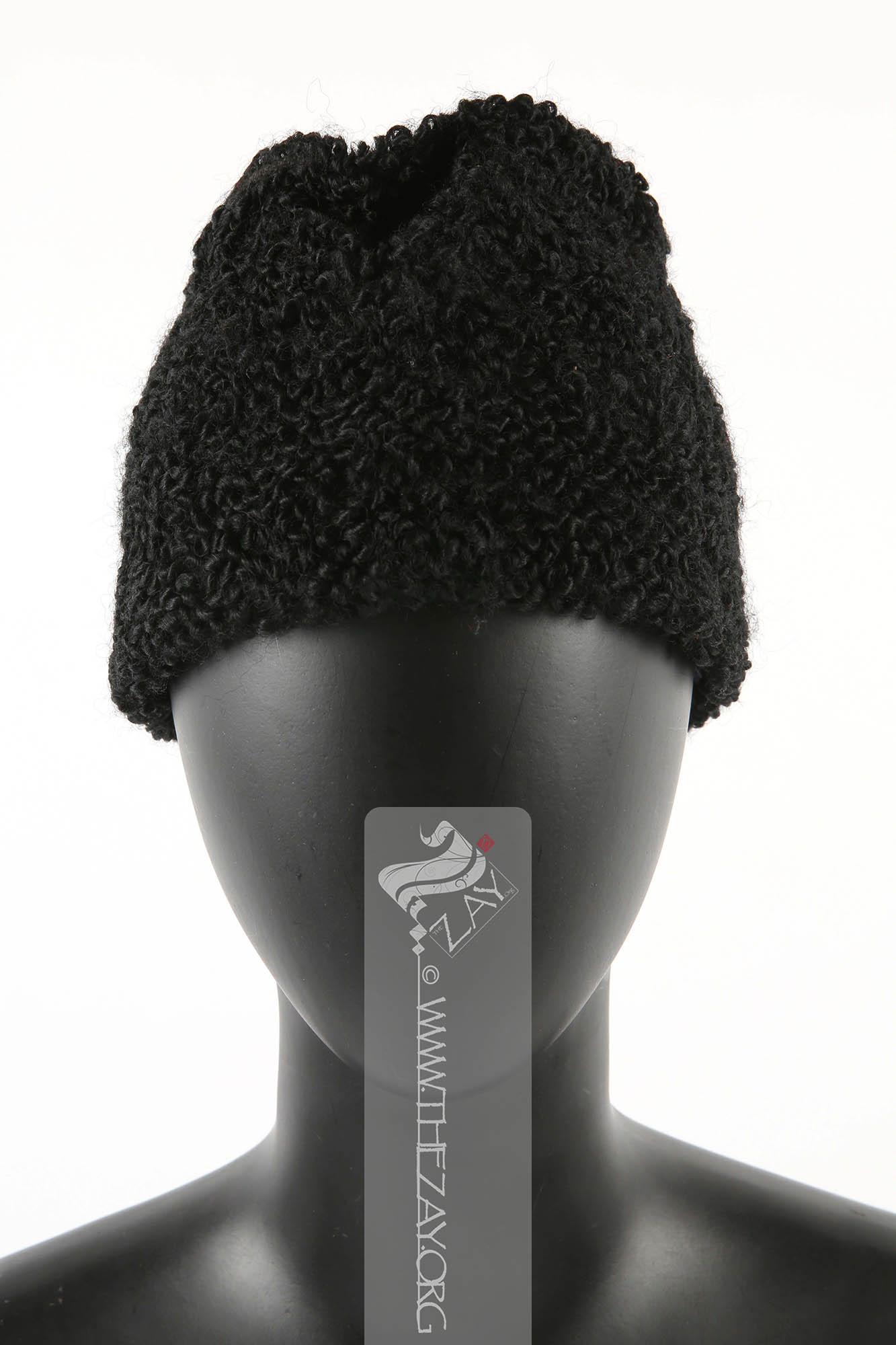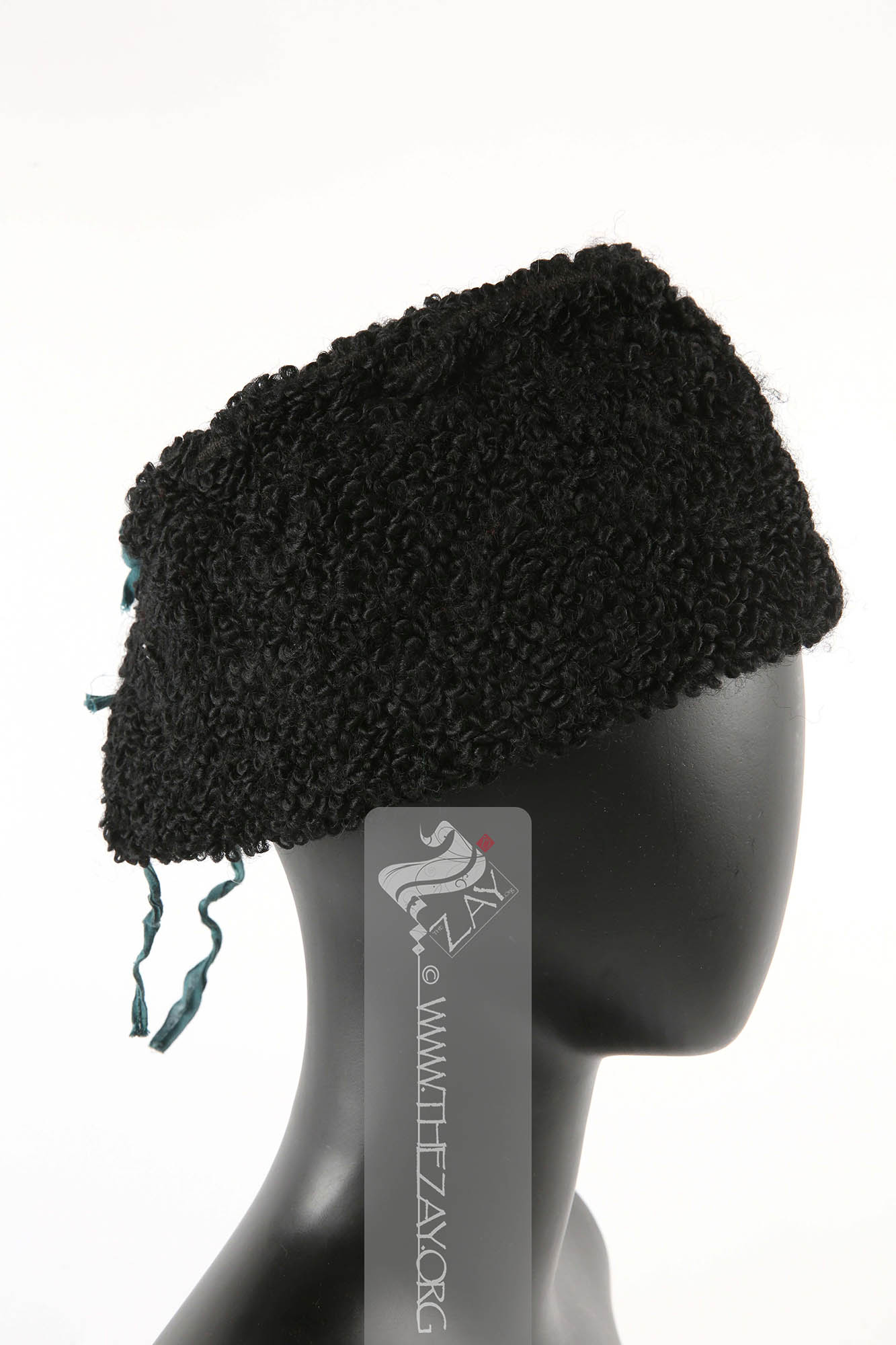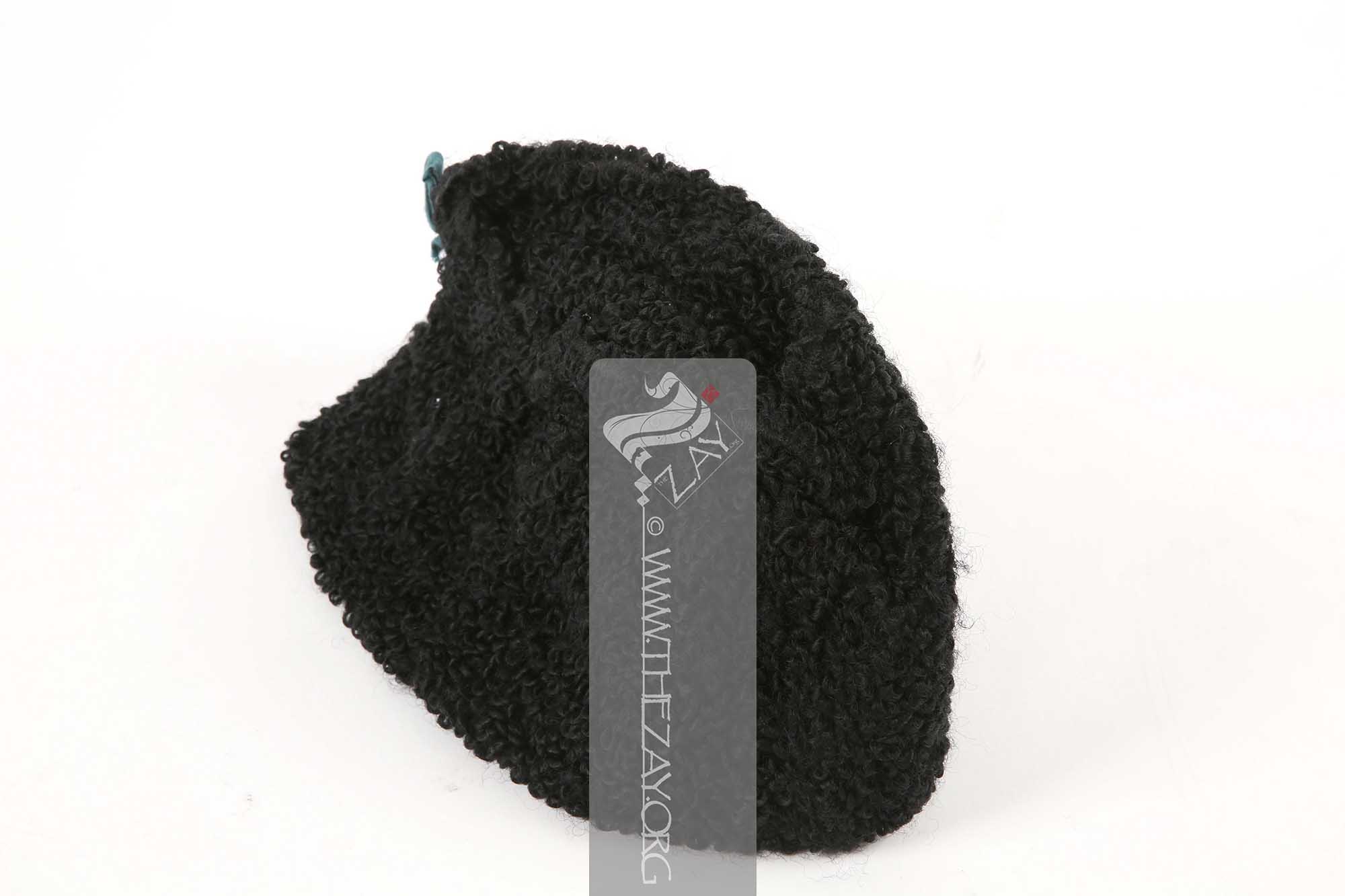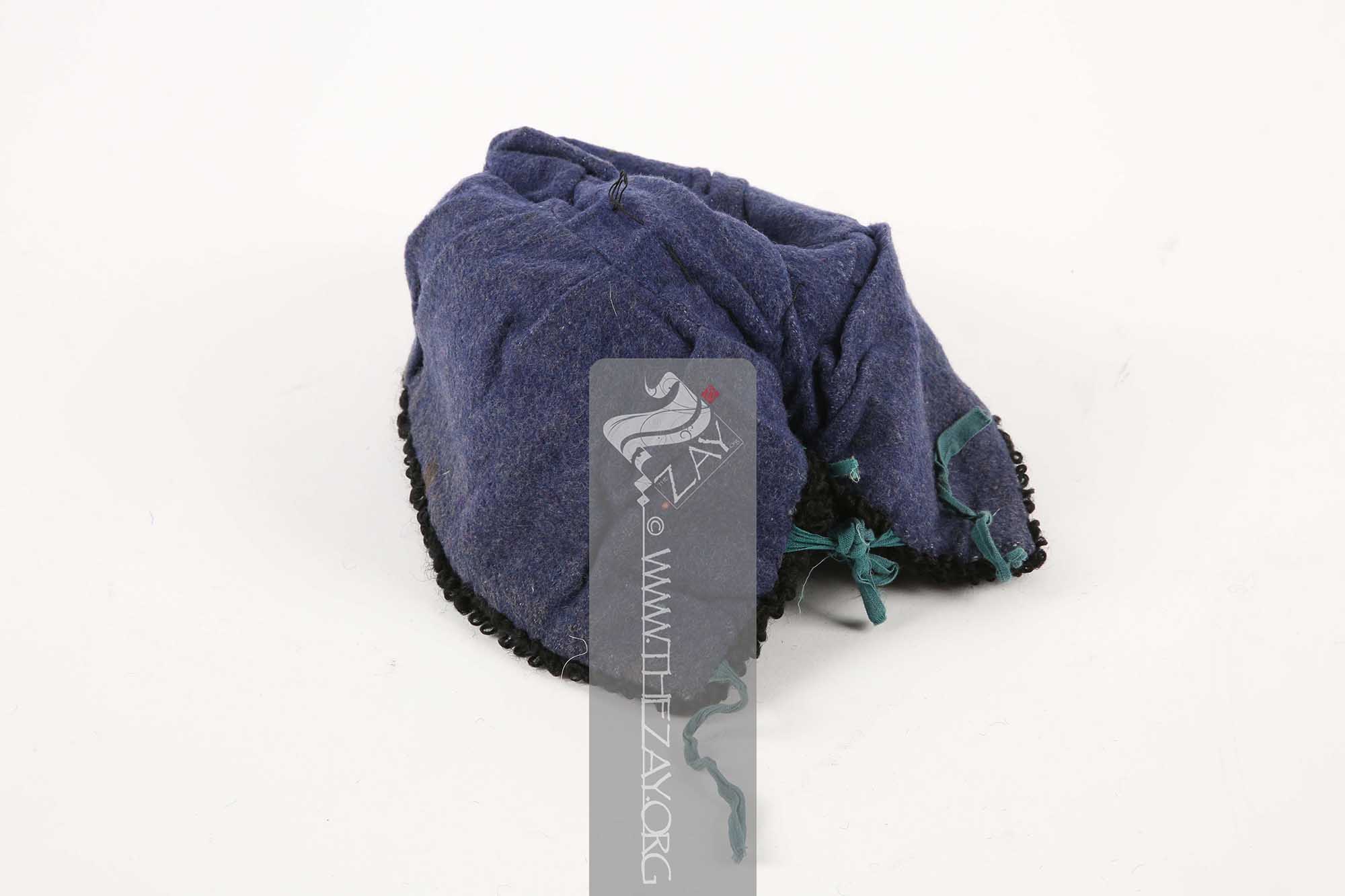Object NotePart of a lot purchased together which includes a woman’s ensemble –blouse, pair of trousers and a jacket (
ZI2020.500741 ASIA,
ZI2020.500741a ASIA,
ZI2020.500741b ASIA) and six other pieces not related to the ensemble (
ZI2020.500741c ASIA,
ZI2020.500741d ASIA,
ZI2020.500741f ASIA,
ZI2020.500741g ASIA,
ZI2020.500741h ASIA,
ZI2020.500741i ASIA).
Object HistoryThis black fleece flat-topped men’s hat was purchased by
Dr. Reem Tariq
Ṭariq: (Arabic; Synonym: tulle_bi_talli
Tūlle_bi_tallī: (French: Tulle – a city in France where fine material for veil was first made; Turkish: tel – wire; Synonym: tariq; talli; badla; khus_dozi ), series of small metal knots made on a woven net ground as embellishment. The term is commonly used in the North African Arab region specifically in Egypt.
; talli; badla; khus_dozi ), series of small metal knots made on a woven net ground as embellishment. The term is commonly used in the Levant Arab region specifically in Lebanon.
El Mutwalli
Dr. Reem Tariq
Ṭariq: (Arabic; Synonym: tulle_bi_talli
Tūlle_bi_tallī: (French: Tulle – a city in France where fine material for veil was first made; Turkish: tel – wire; Synonym: tariq; talli; badla; khus_dozi ), series of small metal knots made on a woven net ground as embellishment. The term is commonly used in the North African Arab region specifically in Egypt.
; talli; badla; khus_dozi ), series of small metal knots made on a woven net ground as embellishment. The term is commonly used in the Levant Arab region specifically in Lebanon.
el Mutwallī: Founder (CEO) of the Zay
Zay: (Arabic: costume, Pl. azyaā’), a set of clothes in a style typical of a particular country or historical period. Initiative, a public figure, speaker and author. An expert curator and consultant in Islamic art and architecture, interior design, historic costume, and UAE heritage. from Kerry Taylor Auctions, London in 2020 to be added to The
Zay
Zay: (Arabic: costume, Pl. azyaā’), a set of clothes in a style typical of a particular country or historical period. Initiative Collection.
Object Features This is a black fleece and felt
Kashmiri
Kashmiri: (Hindustani: Kashmir – a region in South Asia), a term used to denote or identify anything related to the region – its people, their language, culture, art and craft, society etc. style men’s flat hat (
karakuli
Karakuli: (Turkic: Qorako’l – a city in Bukhara region, Uzbekistan; Synonym: Qarakuli
Qarakuli: (Turkic: Qorako’l – a city in Bukhara region, Uzbekistan; Synonym: Karakuli), a traditional headgear originating from the Central Asian countries, like Afghanistan, Uzbekistan, and Tajikistan. is typically made from the fur of newborn lambs and features a distinctive flat crown and a brim, known for its unique curly texture. ), a traditional headgear originating from the Central Asian countries, like Afghanistan, Uzbekistan, and Tajikistan. is typically made from the fur of newborn lambs and features a distinctive flat crown and a brim, known for its unique curly texture. /
qarakuli
Qarakuli: (Turkic: Qorako’l – a city in Bukhara region, Uzbekistan; Synonym: Karakuli), a traditional headgear originating from the Central Asian countries, like Afghanistan, Uzbekistan, and Tajikistan. is typically made from the fur of newborn lambs and features a distinctive flat crown and a brim, known for its unique curly texture. ) variations of which are worn from Russia to the Indian subcontinent.
First introduced in the Indian subcontinent from Central Asia these types of hats were originally brought from Bukhara, Uzbekistan. Traditionally constructed from the fleece of
Karakuli
Karakuli: (Turkic: Qorako’l – a city in Bukhara region, Uzbekistan; Synonym: Qarakuli
Qarakuli: (Turkic: Qorako’l – a city in Bukhara region, Uzbekistan; Synonym: Karakuli), a traditional headgear originating from the Central Asian countries, like Afghanistan, Uzbekistan, and Tajikistan. is typically made from the fur of newborn lambs and features a distinctive flat crown and a brim, known for its unique curly texture. ), a traditional headgear originating from the Central Asian countries, like Afghanistan, Uzbekistan, and Tajikistan. is typically made from the fur of newborn lambs and features a distinctive flat crown and a brim, known for its unique curly texture. lamb of Afghanistan and Central Asia, they started to be gradually made in Afghanistan too.
The South Asian versions of these hats were originally traditionally made in the Kashmir valley of the subcontinent. The naturally soft and curly fleece of these lambs rendered a unique quality to these hats and has always been considered a sign of wealth and prosperity as well as respectability.
This piece has three pairs of cotton ribbon fastenings at the back to loosen or tighten the hat according to the wearer’s ease.
Traditional
Kashmiri
Kashmiri: (Hindustani: Kashmir – a region in South Asia), a term used to denote or identify anything related to the region – its people, their language, culture, art and craft, society etc. wedding practices would often have the groom take off his turban and put on a
karakuli
Karakuli: (Turkic: Qorako’l – a city in Bukhara region, Uzbekistan; Synonym: Qarakuli
Qarakuli: (Turkic: Qorako’l – a city in Bukhara region, Uzbekistan; Synonym: Karakuli), a traditional headgear originating from the Central Asian countries, like Afghanistan, Uzbekistan, and Tajikistan. is typically made from the fur of newborn lambs and features a distinctive flat crown and a brim, known for its unique curly texture. ), a traditional headgear originating from the Central Asian countries, like Afghanistan, Uzbekistan, and Tajikistan. is typically made from the fur of newborn lambs and features a distinctive flat crown and a brim, known for its unique curly texture. while waiting for the bride to arrive. This hat being a part of a lot with other items traditionally worn by Muslim grooms and groomsmen suggests that it was possibly a part of a fairly affluent Muslim groom and his men’s wedding attire.
Links
- https://www.trc-leiden.nl/trc/index.php/en/blog/1267-another-sartorial-make-over-for-hamid-karzai
- https://www.nytimes.com/2005/08/11/fashion/thursdaystyles/the-lamb-on-the-runway.html
- https://web.archive.org/web/20080512082342/http://infurmation.com/pdf/hsuskar01a.pdf
- https://breeds.okstate.edu/sheep/karakul-sheep.html?Forwarded=afs.okstate.edu/breeds/sheep/karakul/
- https://books.google.ae/books
- https://www.thecitizen.in/index.php/en/NewsDetail/index/14/21856/Karakuli
Karakuli: (Turkic: Qorako’l – a city in Bukhara region, Uzbekistan; Synonym: Qarakuli
Qarakuli: (Turkic: Qorako’l – a city in Bukhara region, Uzbekistan; Synonym: Karakuli), a traditional headgear originating from the Central Asian countries, like Afghanistan, Uzbekistan, and Tajikistan. is typically made from the fur of newborn lambs and features a distinctive flat crown and a brim, known for its unique curly texture. ), a traditional headgear originating from the Central Asian countries, like Afghanistan, Uzbekistan, and Tajikistan. is typically made from the fur of newborn lambs and features a distinctive flat crown and a brim, known for its unique curly texture. -Cap-a-Living-Legacy








